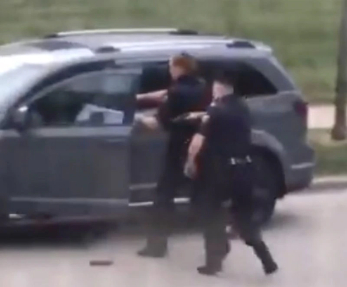
New research shows significant declines in trust, particularly among young Black residents and those with prior arrests.
The 2020 police shooting of Jacob Blake in Kenosha, Wisconsin, sent shockwaves through nearby Chicago, drastically eroding trust in law enforcement among Black residents. A recent study published on September 11, 2024, in PLOS ONE reveals that trust in the police among Black Chicagoans fell by 31% in the aftermath of the shooting, with the steepest declines seen among younger people and those with prior encounters with the justice system.
The study, conducted by Jonathan Ben-Menachem and Gerard Torrats-Espinosa of Columbia University, analyzed data from an ongoing survey by the Chicago Department of Public Health. This survey, which was coincidentally being conducted when Blake was shot, asked residents about their trust in law enforcement. By comparing responses from the weeks before and after the August 23 shooting, the researchers were able to identify a sharp drop in confidence in the police among Black Chicago residents.
Jacob Blake, a 29-year-old Black man, was shot in the back by Kenosha police officer Rusten Sheskey, leaving him paralyzed from the waist down. A video of the shooting quickly went viral, igniting protests across the U.S. against police violence and racial injustice. The study found that during the two weeks following the shooting, Black Chicago residents—particularly those aged 18 to 44—reported a significant decline in their trust in law enforcement.
The loss of trust was especially pronounced among Black residents who had previously been arrested or incarcerated, a group that already had historically strained relations with the police. By contrast, the study found that trust in police among white residents remained relatively stable throughout the same period.
“This study underscores the profound impact that high-profile incidents of police violence have on public perceptions of law enforcement, particularly among communities already marginalized by the justice system,” said Ben-Menachem. The researchers emphasized that these shifts in trust can have serious consequences, potentially exacerbating public safety issues by making communities less likely to cooperate with law enforcement.
Interestingly, the study found that these results persisted even after considering other potentially influential events, such as the COVID-19 pandemic and the shootings in Kenosha carried out by Kyle Rittenhouse during protests following the Blake shooting.
While previous studies have shown that incidents of police violence can erode public trust, this research sheds new light on how these effects vary depending on factors like age, race, and prior encounters with the justice system. According to the authors, “We found these changes were most pronounced among three groups: Black residents, young people, and those who had previously been arrested or charged with a crime.”
The study’s findings highlight the deep and lasting impact that police violence can have on communities, particularly Black communities, and suggest that rebuilding trust will require more than just surface-level reforms. As protests against police misconduct continue to shape national conversations, studies like this offer important insights into the complex relationship between law enforcement and the public they serve.
Reference:
Ben-Menachem J, Torrats-Espinosa G (2024) Police violence reduces trust in the police among Black residents. PLoS ONE 19(9): e0308487. https://doi.org/10.1371/journal.pone.0308487





